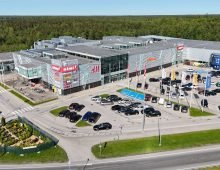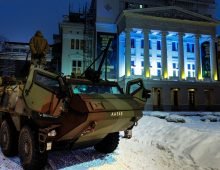The 2025 city budget prioritizes promoting active lifestyles among Tallinners and developing sports infrastructure, with a total allocation of €36.4 million for operating and investment costs in the sports and physical activity sector.
“Next year, Tallinn holds the title of European Capital of Sport, which means not only hosting more major sporting events but also putting greater emphasis on improving the daily physical activity habits of residents,” said Deputy Mayor Kaarel Oja. “As part of this initiative, we’ll establish nearly ten new public sports facilities across the city, increase support for children and youth sports programs, and launch an extensive series of training sessions for seniors,” Oja highlighted, providing examples of new initiatives.
The city’s program for the European Capital of Sport year is titled “One More Lap” and will spotlight a different sport each calendar month, showcasing opportunities to engage in those activities. National sports federations, elite athletes, sports clubs, and enthusiasts will be involved in the program.
In January, the focus will be on winter sports, including the creation of a winter sports park at the Tallinn Song Festival Grounds and a new artificial snow ski trail. The year’s highlight will be the 57th International Children’s Games in August, which will bring nearly 1,000 participants aged 12–15 from 70 cities worldwide to compete in seven sports. As part of the event, Tallinn’s Freedom Square will feature beach volleyball and 3×3 basketball courts, which will remain open to the public for a period after the games.
In addition to traditional events, Tallinn will host various championship events, including offshore sailing, powerboat racing, and the Division I Group B Ice Hockey World Championships. Other notable events include a FIS Cross-Country Skiing World Cup stage and European Championships in figure skating, gymnastics, and billiards. The city has allocated €4 million for the European Capital of Sport program, with an additional €1.6 million to support the organizers of international events.
The city has revised its sports funding measures and streamlined their conditions. “We are placing particular focus on supporting youth sports activities. The funding subsidy per participant for youth sports clubs will increase from €6.9 million to €8.6 million, extending eligibility to children aged 5 and 6,” Oja emphasized. “The goal is to make sports accessible to all young people by increasing the city’s contribution to sports clubs, thereby reducing the financial burden on parents.”
The enhanced support system will require amendments to Tallinn’s sports funding regulations, which will be implemented in collaboration with sports club representatives during the second half of the year.
Beyond organized youth sports, the city is systematically addressing physical activity among seniors. “Starting early in the year, we’ll launch dozens of weekly swimming, strength training, athletics, and ball games classes led by professional coaches, engaging up to 2,500 pensioners across the city every week,” Oja said.
From January, the management of the city’s sports facilities will be reorganized, consolidating seven different sports centers, including 21 sports halls, swimming pools, and stadiums, under a single administration named the Tallinn Sports Center. This reform aims to modernize and standardize the services offered by sports facilities, ensuring they meet residents’ expectations while improving the economic efficiency of facility management.
Key investments in the sports sector include the renovation of Kadriorg Stadium and the construction of the Lasnamäe swimming pool. Renovation work will begin at Kadriorg Stadium, which will celebrate its 100th anniversary in 2026, with a total project cost exceeding €20 million. Concurrently, the city will resume preparatory work for a full-sized swimming pool on Varraku Street. Preparatory work will also continue for the expansion of the Sõle Sports Center. In collaboration with the Estonian Football Association, the city will begin designing and constructing a year-round indoor football hall at Punane Street 69. Additionally, plans include the construction of the Rannavärava Stadium near Skoone Bastion to address the shortage of sports facilities for central city schools.
A total of €28.2 million is planned for operational expenses in the sports and physical activity sector, with €8.2 million allocated for investments.
The Tallinn City Government has submitted the proposed 2025 city budget to the City Council, totaling €1.29 billion. Operational expenses account for €1.03 billion, with €250 million allocated for investment activities. Total revenue is projected at €1.1 billion.
Source: tallinn.ee


















